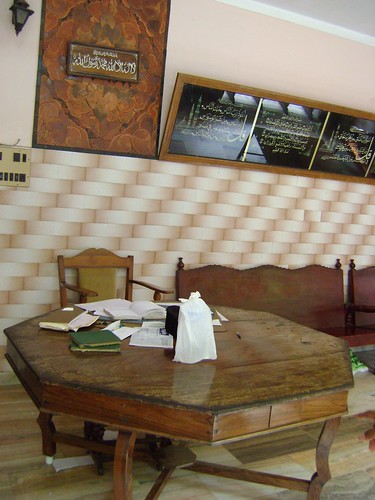By Kashif-ul-Huda, TwoCircles.net,
Screaming headlines announced the death of Mohammadali Shihab Thangal (4 May 1936 -1 Aug 2009). Most identified him as the political leader, president of the Kerala unit of Indian Union Muslim League. A few recognized him as the spiritual leader or leader of the Muslims of Kerala. Yet others gave him credit for launching the era of coalition politics in India, keeping UDF united in Kerala, a secular leader who kept Kerala calm during the tumultuous period after Babri masjid demolition. Still his multi-faceted personality is difficult to be contained in few articles.
Story of Mohammadali Shihab Thangal starts many generations ago. His family is descendent of the Prophet. Mohammadali Shihab is 37th generation away from the Prophet in his lineage. About 300 years ago his family arrived on the coast of Kerala from Tarim in Hadhramaut region of Yemen. They landed in Kannur and made it their home. They came here to spread the message of Islam in Kerala. Three hundred years later they continue to serve the cause of Islam.
In the month of May, I was fortunate to visit Mohammadali Thangal at his residence in Malappuram district of Kerala. It was a weekday but his house was full of people waiting to meet him, some to ask for prayers and others for resolution of their problems. People have been there since early morning and due to his ill health (he was suffering from Diabetes) his son was attending the visitors.
My host in Kerala, Zubair Hudawai arranged this meet and I am not sure how or why but this important political and religious leader of Kerala invited me in. I was struck by his simplicity and though he was very sick he sat back on the edge of his bed. He enquired about me and life of Muslims in the US. Though hesitant I managed to ask him few questions about his family, politics, and community relations.

He is proud of his heritage but equally important was his being Indian. He said that his family arrived in Kerala and adopted local traditions highlighting the point that religion is not eating certain types of food, speaking a certain language, or dressing up in certain clothes. Kerala Muslims have carried the banner of Islam high though the earliest mosques in the state are not much different from temples of that era. They eat local dishes and speak Malyalam and have remained true to the principles of Islam.
Mohammadali Thangal pointed out that we are Muslim but not different than other Indians. Therefore, it was no contradiction for him to be a political leader along side him being a religious and spiritual leader. He acquired spiritual leadership because of his family, he studied in madrasas and Al-Azhar in Egypt to become a religious leader. Though he inherited political leadership but he earned the respect as the undisputed leader of the Muslims of Kerala. He remained president of the Kerala unit of Indian Union Muslim League since 1975.
He made Muslim League a strong political and social force in Kerala. Political, social, and religious leadership of Muslims of Kerala always came together to work for the betterment of Muslims. Kerala Muslims who lagged behind in literacy not too long ago have leap-frogged in education in just one generation. Mohammadali was the architect behind the United Democratic Front of Kerala. Muslim League in Kerala leveraged whenever they were in power to get facility for education for the Muslim areas. Today Malappuram is full of schools and colleges and community aware of importance of education. A lot of the credit for this awareness goes to the social, religious, and political leadership of Muslims of Kerala.

Many problems have been resolved on this table standing in his verandah.
Given this rapid turn around in the status of Muslims of Kerala, I asked him about his message to the Muslims of India. His message was simple: unite, wherever you are come under one banner. Of course, that is the secret of the success of the Kerala model where all Muslim groups come together whenever there are important issues.
Considering his ill health, I asked permission to leave so as not to discomfort him anymore but this person of immense humility wouldn’t let me go without having a cup of tea. A tea without milk reminded me about khanqahi tea served in sufi hospices of North India. I looked around the room to see some pictures with important dignitaries, trophies, and certificates among his humble possessions. I asked about a trophy that was shaped like a pen. This was for a book that Thangal wrote, I was informed. It seemed that I had just scratched surface of a life worth lived.
Panakkad Syed Mohammadali Shihab Thangal [ 4 May 1936- 1 Aug 2009]
